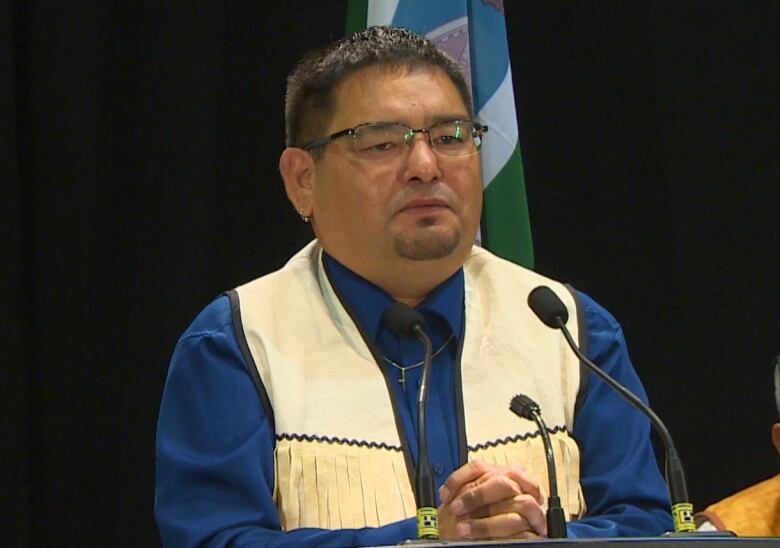Innu Nation's 3rd human rights report in 3 decades implores governments to take action
Not much has changed since reports in 1993 and 2002, say Innu leaders

The Innu Nation hopes a new report on the challenges Labrador Innu face its third report in three decades will finallyforcethe federal and provincial governments to work with it to provide solutions.
TheInnu Nation and the Canadian Human Rights Commission released a 70-page report Monday outlining difficulties Innu face in daily life, and community leadershope the study will work as a road mapto helping Labrador Innu.
"Positive and decisive action by the government of Canada in response to the recommendations in the report is essential for the Innu of Labrador,"Etienne Rich, grand chief of Innu Nation, said Monday afternoon during a news conference in St. John's.
The report, authored byCeleste McKay andlaw professor Donald McRae, outlines several areas where gaps between Innu Nation and government services still exist, including systemic racism, health care, child and family services, education, language, culture, housing, the justice system and economic well-being.
McRaealso authored reports in 1993 and 2002 in whichthe same problems were identified.
"What was also critical in 1993 was the need to allow the Innuto have the opportunity, the resources and the freedom to take control of their own lives," McRae said.
"Yet we find, after 26 years they're still unable to do so. There is still no agreement on land rights and self-government."

The reportoffers a list ofrecommendations for the federal and provincial governments, the first being that the federal government should make a new commitment to the conclusion of modern treaty negotiations with the Innu in accordance with its human rights obligations.
"Such a commitment must ensure that the negotiations will result in remedying the wrong done to the Innu by the failure of the federal government to exercise its constitutional responsibilities to them for a period of50 years," the report reads.
"Canada should aim to resolve negotiations for the conclusion of a modern treaty within three years of this report."
In1996, the federal government entered into a framework agreement with the Innu to negotiate a comprehensive claim settlement or modern treaty recognizing Innu land rights, according to Monday's report.
However, the report says, the2002 report found that these negotiations had stalled. While progress has since been made, there is still no agreement on the table.
Rich told reporters some recommendations from the previous reports have been honouredbut treaty negotiations are part of his focus from the newest report.
"The treaty negotiations have been on the table for 30 years and there's so many previous government officials that have changed. We're stuck on the same page, and these are the kinds of things that we're really looking forwardto move forward," Rich said.
"I think Canada and the provincial government need to focus on some of the stuff that has been stalling for so long."
Further recommendations
The report also includes a detailed list of challenges and solutions the Innu Nation hope will be ratified, including:
- Immediate action to resolve critical gaps in services that include measures put forward by Innu child and family service providers.
- Equal funding for Innu schools comparableto provinciallyfunded schools.
- Quick movement to address health issues and violence against Innu women and girls.
- Support for anti-racism measures to address systemic racism facing the Innu.
- A timely launch of the promised inquiry into the treatment of Innu children in provincial care.

Mary Ann Nui, deputy grand chief of Innu Nation, said the gaps and challenges outlined in Monday's report are the same she, her parents and grandparents havelived with.
"I want to be able to say to all the children, and grandchildren and all the Innu that it was in 2021 that Canada took immediate, serious steps to close the gaps," Nui said.
"On behalf of the Innu of Labrador, I call on Prime Minister Trudeau to immediately order the closure of these gaps."












_(720p).jpg)


 OFFICIAL HD MUSIC VIDEO.jpg)
.jpg)



























































































